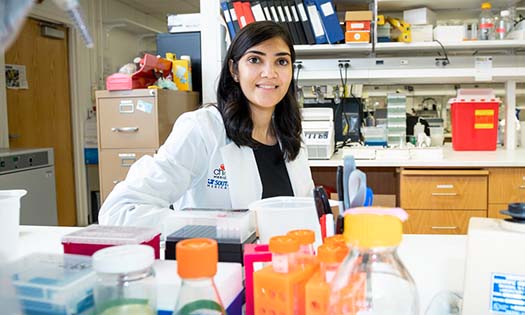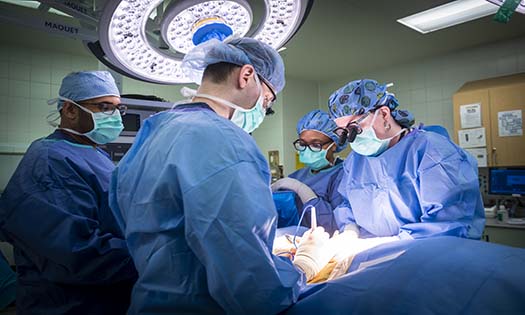In this Q&A, learn how a new clinical trial of orlistat offers a potential long-term treatment for children with FCS
Familial chylomicronemia syndrome (FCS) is a devastating genetic disorder that causes severely high triglyceride levels and serious complications like recurrent pancreatitis. Children with FCS must limit their daily dietary fat intake to 10 to 15 grams, which eliminates most childhood favorites like pizza, pasta and sweets. Kids can’t enjoy the same foods as their peers and it’s difficult for families to dine out.
There isn’t a cure for FCS. Until recently, there wasn’t even a medical treatment.
After research findings suggested that orlistat (a popular weight loss drug that treats obesity) can lower triglyceride levels caused by FCS – experts at Children’s Medical Center Dallas, part of Children’s Health℠, and research partners at UT Southwestern – introduced the nation’s only clinical trial studying orlistat as a treatment for children and adults with FCS.
The Pediatric Endocrinology Program at Children’s Health is home to the region’s most comprehensive pediatric Lipid Disorders Program. Nivedita Patni, M.D., Pediatric Endocrinologist at Children’s Health and Assistant Professor of Pediatric Endocrinology at UT Southwestern, is spearheading the pediatric portion of the trial. Abhimanyu Garg, M.D., Director of Metabolic Diseases in the Center for Human Nutrition and a Professor of Internal Medicine at UT Southwestern, is the trial’s principal investigator.
In this Q&A, Dr. Patni addresses the impact FCS has on patients and how this clinical trial on orlistat may improve their quality of life.
What is familial chylomicronemia syndrome (FCS)?
FCS is an extremely rare genetic disorder that affects approximately 1 in a million people worldwide. It’s an autosomal recessive disorder, so parents rarely know they carry the gene change that causes it. FCS is also known as type 1 hyperlipoproteinemia (T1HLP), lipoprotein lipase deficiency (LPLD) and familial hypertriglyceridemia.
Children born with FCS either can’t make lipoprotein lipase or it doesn’t work as it should. This enzyme helps the body break down triglycerides in the blood. But when lipoprotein lipase is missing or ineffective, triglycerides build up in a child’s blood, causing levels that often exceed 1,000 mg/dL. Known as hypertriglyceridemia, this condition leads to recurrent, severe pancreatitis that can become life-threatening.
How do you treat FCS?
Traditional triglyceride-lowering medications don’t work on FCS, and there aren’t FDA-approved treatments for FCS in children. In February, the FDA granted orphan drug designation to the investigational medicine olezarsen for the treatment of FCS in adults. There aren’t any studies on the drug’s efficacy and safety in pediatric patients. This is why the orlistat clinical trial is so important. Orlistat may be a family’s best hope at managing this disease.
How does orlistat treat FCS?
Orlistat is a pancreatic lipase inhibitor. It’s proven to reduce dietary fat absorption by 30%. Dr. Garg and I conducted an open-label clinical trial that showed orlistat can dramatically lower triglyceride levels in children with FCS. This was a pilot trial of two patients. The 9-year-old boy in the study had a 53% decrease in triglyceride levels, while the 11-year-old boy saw a 62% drop.
What is the focus of your current clinical trial on FCS and orlistat?
In April 2023, Dr. Garg and I began recruiting people between age 8 and older for a national clinical trial called the “Long Term Efficacy and Safety of Orlistat for Type 1 Hyperlipoproteinemia.”
This randomized, double-blind, placebo-controlled trial investigates whether orlistat can be a safe, long-term treatment for lowering fasting serum triglyceride concentrations in patients with FCS who follow an extremely low-fat diet. Our goal is to enroll 28 patients for this 56-week study. We can’t enroll children younger than 8 because study participants must be able to swallow an orlistat or placebo capsule.
The study consists of the following outpatient appointments:
Initial screening visit: During this screening, we advise participants of the need to consume an extremely low-fat diet for the duration of the study.
Phase 1: After a baseline period of 8 weeks, we randomly assign participants to take a placebo or orlistat for 24 weeks.
Phase 2: At the end of 24 weeks (phase 1), all patients enter an open-label extension and receive orlistat for 24 weeks for a total study duration of 56 weeks.
During the last weeks of the baseline period, phase 1 and phase 2, we will analyze blood lipids and a chemistry panel for three consecutive days. We’ll measure fat-soluble vitamin levels once.
How do I refer a patient for the FCS and orlistat clinical trial?
Patients 8 and older with an FCS diagnosis and fasting serum triglycerides of 750 mg/dL or higher can enroll in the clinical trial. We can conduct genetic testing at Children’s Health to confirm a diagnosis.
To enroll a patient in this clinical trial: Visit ClinicalTrials.gov.
Why Children’s Health Pediatric Endocrinology Program
U.S. News & World Report consistently rates the Pediatric Endocrinology Program at Children’s Health among the best in the country. As a regional leader in pediatric lipid disorders, we’re pioneering innovative treatments for complex lipid and metabolic disorders that affect children.


